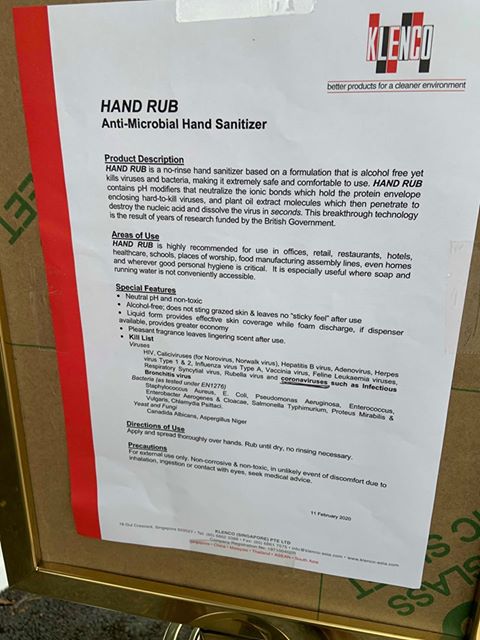Follow us on Telegram for the latest updates on the Coronavirus: https://t.me/mothershipsg
A cleaning supply company, Klenco-Singapore, drew long queues of people to its outlet in Gul Crescent, Tuas, for its sale of hand sanitisers on Feb. 16.
Called HAND RUB Hand Foam Sanitiser, the product was advertised as able to kill, among other things, sexually-transmitted viruses such as HIV and herpes, and coronaviruses.

Source: Mothership Reader
Sold above normal price to deter would-be profiteers
The hand sanitiser was also sold above its normal price to deter would-be profiteers.
The company also stated in their Facebook post that they would donate S$15,000 to The Courage Fund or any National Council of Social Service's fundraising efforts.
A Facebook post by Klenco-Singapore's on Feb. 14 revealed these intents when it stated that a single five litre bottle would be sold at S$30 instead of its usual price of S$18.
The sale also limited the number of bottles that could be sold to one per person aged 16 or older, with the requirement to present one's NRIC, and a ban on re-queuing.
Hundreds in the queue
A Mothership reader who went down to the sale shared that he had queued for an hour and a half to purchase a bottle and gave an estimate of between 400 to 500 people in the queue.
Source: Photo shared by Mothership reader
Source: Photo shared by Mothership reader
Source: Photo shared by Mothership reader
Source: Photo shared by Mothership reader
Source: Photo shared by Mothership reader
Separately, another video by Facebook user Benson Lau, gave an estimate of 500-750 people and 250 metres for the length of the queue.
[video width="848" height="480" mp4="https://static.mothership.sg/1/2020/02/10000000_177439167004157_8104303221318275515_n.mp4"][/video]
The Mothership reader also stated that some people had allegedly arrived to the sale with their family members to purchase three to four bottles, and had supposedly started queuing as early as 7am in the morning.
The reader also estimated that about 12,000 bottles of the hand sanitiser were sold.
Mothership has since reached out to Klenco-Singapore for further confirmation on the matter.
How effective is this product supposed to be?
Neither the HIV nor the herpes viruses are able to survive for an extended period of time outside the human body.
As such, this means that the viruses are unlikely to spread by say, sharing toilets, food, or bath towels.
In the case of the novel coronavirus (Covid-19) however, it has been found in an external environment, such as on the door handle of an infected patient's house in Wuhan.
An official for the Disease Control and Prevention Centre in Guangzhou has also listed “mobile phones, keyboards and faucet handles” as other areas prone to contamination.
Top image collage courtesy of Mothership reader
